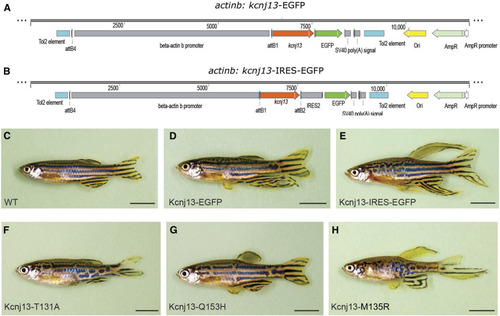|
Long-finned phenotype is dependent on potassium conductance. (A–E) Overexpression of kcnj13 mimics Dhi2059 phenotypes. (A and B) Schematic illustration of constructs used for Tol2 transgenesis with a kcnj13-EGFP fusion construct or with independent EGFP. (C) WT noninjected fish. (D) Representative injected fish with actinb-kcnj13-EGFP construct. (E) Representative injected fish with actinb-kcnj13-IRES-EGFP construct. (F–H) Representative phenotypic changes of the three kcnj13 mutants. actinb-kcnj13-T131A-IRES-EGFP (F), actinb-kcnj13-Q153H-IRES-EGFP (G), and actinb-kcnj13-M135R-IRES-EGFP (H). Only M135R-, but not T131A- or Q153H-, injected fish developed long-fins, but all have pigmentation pattern disruption. Partial elongation of certain fins and pigmentation changes most likely result from the mosaic nature of Tol2 transgenesis. Bars, 5 mm. AmpR, ampicillin resistance, EGFP, enhanced GFP; IRES, internal ribosome entry site; WT, wild-type.
|

